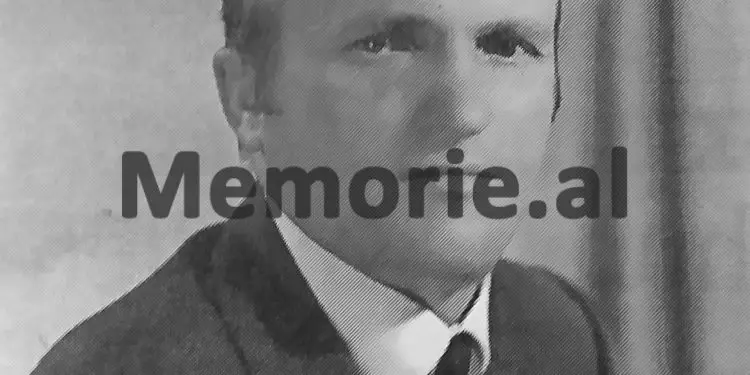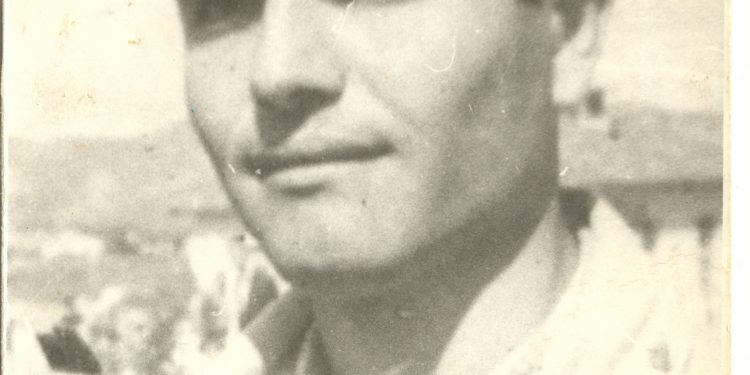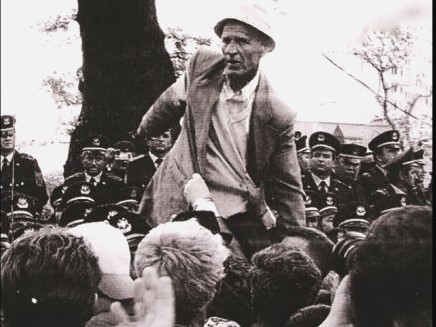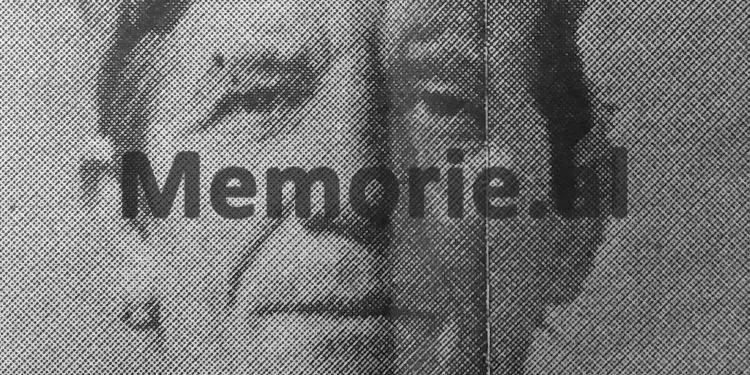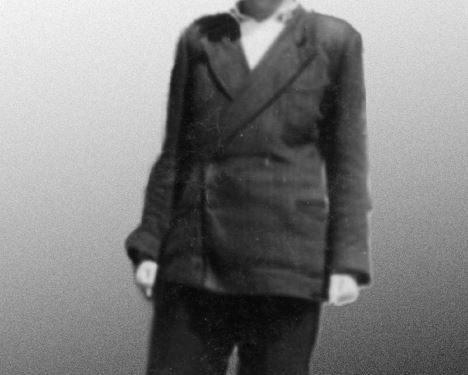By Elisabeta Ilnica
The first part
Xhavit Gjana: “At the investigator they provoked us with women in the cell; there were also rapes, such as…”!
Memorie.al / He were a 25-year-old teacher, who worked in the deep villages of Kukes, but with such great ideals that he sought to overthrow a dictatorial system. And the only way to achieve this goal was the killing of Enver Hoxha, against whom a concrete assassination was planned and attempted in Kodër-Kamze. A brave utopia at the end of the 60s, of a group of eight intellectuals, which also included the main character of this article, Xhavit Gjana, whom he introduces us to in this interview. In fact, what you will read below is not just an interview, but a testimony of psychological, physical and sexual terror in the cells of the communist dictatorship of Enver Hoxha and his successor, Ramiz Alia.
It is the dignified survival of a political prisoner, whose desire for freedom cost him his youth and yet he does not feel remorse. The humorous conversation with Xhevat Gjana was a separate reflection on the opening of the files and why not, that such political convicts should be members of the state commission that would enable this process. As Xhevati says, he or his co-sufferers do not seek revenge, but the truth. Because only the truth would free them from the ghosts of the past…!
Mr. Gjana, the story of the group of Kuksians who tried to kill Enver Hoxha in the late 60s, has been mentioned somewhat, but it has mostly remained in the form of rumours. What is the truth was there really a group from Kukësi that tried to kill the head of the APS, Enver Hoxha?
Yes, the band was real. And for this, evidence that beats any rumor, are the records of that time, even though some of them have disappeared. The group consisted of eight people, most of them cousins, and we were discovered one by one. Raif Elezi was arrested first, then Bajram Gjana, then I Xhavit Gjana, Avdi Gjana, Shefqet Gjana, Shemsi Domi and Muharrem Selmani.
Havzi Nela was also in the group, but he was arrested two years before us. While an eighth was arrested with us, but they separated him from our case, because in fact he had no connection and was an ordinary for murder.
Of the persons mentioned, Shefqeti, had finished Language-Literature, I Mathematics-Physics, most of them were teachers.So we didn’t make plans with a full group, so as not to raise doubts about two teachers, in an 8-year school. Avdiu and Shemsiu were teachers of the lower cycle.
Muharrem and Raifi were top radiologists, so we were all intellectuals. Bajram Gjana was arrested for the third time, after having been convicted two other times, for politics. Our group’s idea was to overthrow the system, to overthrow the communist dictatorship, and the only way to achieve this was to kill Enver Hoxha.
Why did you think that killing Enver Hoxha was the only way to overthrow the dictatorship? Why not organize revolts, protests or even a revolution?
Apart from the direct killing of Enver Hoxha, no other action we knew would work, either by killing someone else from the Political Bureau of the ALP and the senior leadership, or by making revolts, protests, and revolutions. Because the State Security had infiltrated every family and these plans were a waste of time, they would be discovered before they were put into operation.
Meanwhile, we also had the model of Hungary. If any revolt broke out, Soviet tanks would be brought in, as it was the model of that time, that communist states were not really independent, they had limited sovereignty. While the killing of Enver Hoxha was effective for us.
How did you organize the plan to kill Enver Hoxha?
Our entire group worked in pairs. That is, each of us was connected with someone from the duo of another group, but none of us knew the details that we were talking about in the duo. I was connected with Avdi Gjana, with Shefqet, Havzi Nela and to some extent with Raif. I never combined with others.
So we didn’t make plans with a complete group, so as not to raise doubts at State Security
. Therefore, even when they caught us, they suspected that we were motivated by foreign services, mainly by the UDB.
And in fact, were you encouraged by foreign services to kill Enver Hoxha?
No, not at all. This does not hold. The idea to kill Enver Hoxha came from the difficult economic and human situation; that we were facing more and more poverty, where the class struggle was very fierce. There was also the total collectivization of 1967, which was completely realized in 1968, and the situation in the province of Kukës became survival.
Above, you said that you combined as a duo with the poet who was hanged in Kukës, in August 1988, the dissident Havzi Nela. How did you connect with him?
Havziu and I were colleagues in Krume, then in Topojan. He was a teacher for Language-Literature, I Mathematics-Physics. For the sake of truth, I must emphasize that Havziu was more advanced in his thoughts against the regime. But he had support and could speak more openly than us, since his uncle, Shahit Sadiku, was from the State Security and everyone knew that.
Havziu didn’t care; he said his thoughts against communism in public, so much so that I had confrontations several times, because I told him that he was putting us at risk, that we would be arrested. I even once said to him: “You are putting me in doubt, don’t be the one from Sigurimi, who speaks so openly and fearlessly against the Party and Enver”. But Havziu had such a nature that he couldn’t hold back, he exploded, until he escaped.
They caught him and brought him back to Albania, together from Kukësi and Tirana, (led by Iljaz Haxhiu, an investigator from the Ministry of the Interior), together with his wife. I participated in the trial that was held for Havziu, because it was open. We went with many colleagues, friends and students and there we made a kind of revolt, under our breath. When the prosecutor spoke, we all did “mmmmmmmmmmm”, but without speaking, so that no one could be recognized by the voice.
From this prolonged “mmmm”, which was constantly repeated under the teeth, like a hornet’s noise, the prosecutor and the judge were enraged, very irritated and threatened. However, this type of revolt had some effect, as Havzi was sentenced to 15 years, while his wife was sentenced to 10 years. Which was a low sentence, considering the charge they had?
And you, in what year were you arrested?
Two years after this event, i.e. after Havzi’s trial, in 1967, our group was arrested. I was arrested on April 19, 1969 and I was released after 8 years, from Burrell Prison.
So, I entered prison aged 27 and came out at 35, when the prime of my youth had passed. Of course, until I was convicted, I went through several horror investigators. I stayed with the investigator for almost two years. At first I was kept for two months in the Kukes investigation, then in Tirana.
Who were your investigators?
In Kukës I had two investigators: Hulusi Poda and Belul Zoto. Hulusiu resigned immediately after two weeks and submitted my case, so did Beluli after two months. Apparently, because I had personal acquaintances, they did not want to confront me. Seeing my determination, then they brought from Tirana, Iljaz Haxhiu, and an investigator from the Ministry of the Interior.
My case and that of the whole group was transferred to the special investigation of Tirana, so they removed it from the district investigation. The chairman of the investigative group was Koço Josifi, then others were: Iljaz Haxhiu, Fejzi Aloçi, Dhimitër Shkodrani, Ferhat Metohiti came from time to time, kept under observation, or Pelivan Luçi, Florian Kolaneci, etc. So there were several and the investigation was quite wild.
When you say “wild”, do you mean the violence in the investigator?
Yes, normal, horrible, animalistic violence.
Which of them has used violence against you?
If there was an investigator who was wild, aggressive, dirty, merciless in physical violence, he was Dhimitër Shkodrani. He hit me once with a taketuke (tobacco ashtray) right in the forehead, which cracked my skull and the bleeding, did not stop.
Why did it hit you?
Because I did not move from my position: “Only the murder of Enver Hoxha will bring down communism.” Then he took the taketuke and said to me: “Do you know that even the taketuke where Enver Hoxha shakes his cigarette, we don’t exchange it for your head?”, and hit me as hard as his hand. Then he gave an internal order to the guard Ali Balla, to put the handcuffs on my wrist, pressing them so hard that he paralyzed my hand.
It got on my nerves. While in Kukës, there was a Mylsym Dervishi, guard. This one, after putting the irons on my two hands that he had caught from behind my back, climbed on top of me, on the handcuffs, jumping with all the power he had, on my tied hands.
I fell to the ground unconscious and I don’t remember anything. Then I remember myself in the dungeon, not feeling my hands. Even today, one of my hands remains semi-paralyzed. There they brought me a prisoner spy, whose name was Hashim Gjoka. He was convicted of infiltrating prisoners, but I did not accept his provocations.
However, all investigators in one form or another exerted pressure: it was also psychological violence, with unprecedented emotional charges, because they cursed you with your mother, father and sister, spat on you. They wouldn’t let you sleep; they wouldn’t take you to the bathroom, letting you have a bowel movement.
You said you wanted to kill Enver Hoxha, but did you have a concrete plan on how? Did you ever get the chance?
Yes, a concrete plan was made and it would be realized by Shefqet Gjana, who was a soldier in Kodër-Kamze. He asked to be a bodyguard in the guild and they approved his request, as he was the youth secretary of the guild and a martyr brother.
He made this request, after he had previously received information that Enver Hoxha would pay a visit to the Agricultural Institute and Kamze, there would be several meetings in the people. The day Enver went there, Shefqeti tried to kill him, but he couldn’t succeed.
Why couldn’t he kill Enver Hoxha?
After failing in the murder, Shefqeti told me to meet him, because he was very worried and with confused emotions. I left Kukësi and met him in Kamze. During the conversation, Shefqeti told me: “I found it very difficult to commit such a great political crime, at such a young age. I wasn’t scared, but I remembered what happened to Bardhok Biba when he was killed, for which half of Mirdita was “sawed”.
For Enver Hoxha, half of Albania could be killed, because our families, it was not even discussed that they would be killed, they would become tombs. Thinking like this, even though I was targeting him, I lowered the ‘Carbine’ (type of weapon). Then I regretted it, but by the time I was ready again, re-mobilized myself, Enver Hoxha passed the firing range. I made a plan with myself that I would definitely kill him on the way back from the visit, but he never went through the same road again”.
This is Shefqet’s conversation with me, of course I don’t remember the exact words, but I reproduced the gist for you. That’s how we missed the chance to kill him.
During the conversation, you talked about psychological and physical violence. What about sexual violence, i.e. rapes against women, in investigations and prisons, has there been?
There were rapes, but also sexual provocations. I am telling a detail that happened to me when I was in the investigator. Next to my dungeon, they brought a woman, who I know by name and surname, Gj. Ç. It was called and they left the cell doors open, like never before. So the investigators tried to use the method of seduction for discovery, through Gj. Ç. Everything was a trap, so that I would go to her and be caught red-handed with GJ.Ç., so that the charges would be added to me, or they would force me to become their accomplice, or who knows what else.
Despite the fact that they left the doors open and Gj. Ç. she was provoking me, I didn’t go to her. Anyway, Gj.Ç. he came to my cell and started to provoke me even more, but I pushed him and said: “Go away, you bastard”! While she cursed me: “Malok”! And ran away. So this attempt of investigation and Security failed. An identical provocation was also done to Shefqet, with a Polish woman named Barbara. So, the investigators themselves put the women in prisons and before bringing them to the convicts, of course they sexually abused them themselves.
Some willingly and some by rape, until the poor surrendered. In the 1950s and 1960s, this method was very common; rapes were done openly, so much so that the smell was everywhere. Then they started to appoint female guards, instead of males, because the Party was worried about “morale”. The method of rape is also widely used in Kruja. I know this well, because after the sentence, I was expelled from Kukësi and settled in Kruja, after I got married there.
The artistry of Kruja has employed nearly a thousand women. The building was located only 10 meters from the Department of Internal Affairs. Adjacent to the wall of Artistica, a barrack was built and the operatives of the Sigurimi held meetings with the collaborators, but not only for espionage. They used the women of Artistica, even for sexual desire, by raping them. Also, the operatives set up the women against each other, spreading quarrels and jealousy, so much so that the whole of Kruja found out that a “kuplaraj” nursery had been set up there by the State Security.
When this nam came out, then the Ministry of Interior from Tirana intervened and demolished this barrack. That there were indeed rapes by the Security, but they were very careful not to make it public. Because they spread the word among the people, that the communist was a “holy man”, but the case with the Artistica of Kruja slipped from their hands. It was very difficult to denounce them, because if this happened, they would physically eliminate you, that is, they would destroy you, or they would make false accusations and put you in prison.
The prisoners were mostly men. In addition to the rape of women, have men been sexually abused?
The post-war investigators were uneducated and what they did not do, from psychological and physical violence, including rape, whether female or male. In the 70s, the situation changed somewhat, at least in terms of rapes, but the cadre of investigators was at a higher level, as they were educated. Meanwhile, pederasty existed inside prisons, among convicts. Even though it was forbidden by law, it was not asked in the camps, as there were many sentenced to tens of years. Memorie.al
The next issue follows




